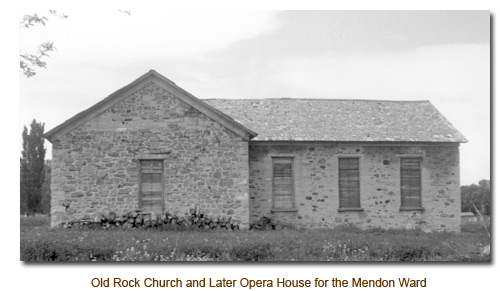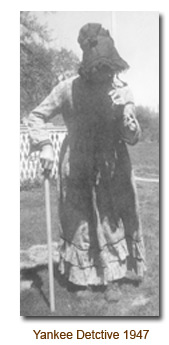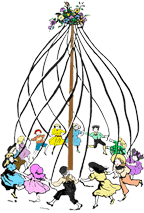Mendon Had Early Drama Company
Mendon, like all other early settlements, had to furnish its own amusements. It was along about 1860, the first settlers had arrived but a year previous and established themselves in the fort. Grandfather Wood had seen a drama in England called “Among the Green Bushes.” He wrote it from memory and the parts were written out and cast. It was played in one end of the fort one night and the other end of the fort the next night. Repeated performances kept the settlers amused and entertained all winter.
Cast Members— Some of the cast were Grandma Wood, Margaret Foster (only a child at that tine), Isaac Sorensen, Roger Luckman, Robert Sweeten, Alfred Atkinson and some of the Hills. The play was presented in Maughan’s Fort the same winter, so Mendon could claim the first dramatic production in Cache Valley.
Following that time every winter was spent producing dramas and farces for their own entertainment as well as to raise money for public benefit. Of course all labor was gratis. Scenery and costumes were crude. A buffalo robe or a tarpaulin from the Q. M. or even a soldier’s uniform salvaged from Johnson’s Army invasion were treasured properties.
In 1862 a fully organized company was putting on such plays as “Michael Erle,” Ben Bolt” and the “Floating Beacon,” masterpieces that only professionals would undertake. The settlement was fortunate in having some real dramatic talent in its midst. Tom Crowshaw and later Phil Magotts, as well as Rebecca Hardman.
Walter Paul was president in the early seventies with John Donaldson as stage manager and Isaac Sorensen as treasurer. Jim Hill claimed the job as doorkeeper and curtain roller from the start, which position he held for many years
Paid In Produce— Money was scarce those days and almost anything offered would be accepted as admission such as candles, vegetables, grain and dried fruit. Proceeds received in cash were used to stock a library. Male members of the company were Henry Gardner, Alfred Gardner, Joseph T. Wood, Jacob Christian and Henry Sorensen, John Hughes and Traugott Stumpf. Lady members were Elizabeth Wood Stumpf, Seny Sorensen, Susan Hancock, Effa Willie Annie Paul, Sarah Walker, Lydia Anderson, Margaret Foster, Sarah Graham and Martha Paul.
Later members included the Whitneys, all talented in drama. Their father played in the original Salt Lake troop. Andrew Sorensen was especially talented and directed the play for years. Among these were “East Lynn,” ‘The Lost Ship,” “Innkeeper of Abbiville” and “Lady of Lyons” with casts including Emma Sorensen, Delila Bird, Alex Baker, Emil Stumpf, Jr., August Harder, Morey Baker, Jemina Foster, A. G. White and others.
About 1908 a younger generation took over with L. K. Wood as general manager for many years, and Annie L. Richards Hughes as secretary and treasurer which position she still holds. She also appeared in several plays. L. K. Wood designed and painted new scenery with H. B Whitney, H. A. Foster, H. C. Sorensen and Wayne Willie assisting. These men all held positions in the organization and played important roles in the casts. John D. Baker, Jacob Sorensen, Jr., Frank Sorensen and Oliver Taylor shared responsible positions as well as playing parts.
Drama was revived with such enthusiasm that the people spent the winters in this work continuously until about 1925 when the movies replaced the drama. Such plays as “Up Vermont Way,” “Call of Authority” by L. K. Wood, “Brookdale Farm,” “In the Shadow of the Rockies” “Lone Tree Mine,” “Imogene,” “Under the American Flag,” “Shore Acres” and others. During the centennial year of 1947 the plays “Under the American Flag,” “Road Back Home,” and “Yankee Dectetive” were repealed by request under the general management of Wayne Willie and director L. K. Wood, to large and appreciative audiences. The townspeople having always supported the organization and enjoyed the productions. Joseph and Viola Larsen, Earl and Glen Buist, Alvin Kidman and Geraldine Kidman, John Baker and others were included in the casts.
The task of writing out parts and acting as prompter, one of the least appreciated yet most essential jobs, was for years taken over by David Elder Buist, who emigrated from Scotland. He received only tickets for his family to attend the shows for his services. Others to whom tribute should be giver are Alfred Gardner, Isabella Foster, Isabella Stumpf, Pearl J. Wood, Delone Larsen and Pearl Bird.
Music Was Free— The music played between acts was performed free of charge. The Sweeten, Wood and Whitney orchestras should in the course of eternities be rewarded, as their labor too was gratis— not more than complimentary tickets. Florence Bowen Wood played the lead in several shows with pronounced ability and Denver Copen and Vance Walker and others added to the troop in later years, interpreting heavy roles on a creditable way. Lizzie Stumpf Barrett displayed considerable talent in comedy roles and has continued to entertain the public with readings.
The enjoyment we received from our work fully repaid us. Financing the ward, buying pianos, helping finance missionaries and other worthy causes brought a source of satisfaction far beyond that of monetary gain. We were bound together in friendship and unity. The winters passed too quickly. Even spring did not have its usual welcome as the drama would have to be put aside for our labor on the farm.
The conclusion of each season’s work would be climaxed with a party and review of the plays and perhaps a preview of the next season’s work. Those were happy days filled with true friendship and rapture that only the drama can supply.
![]()
